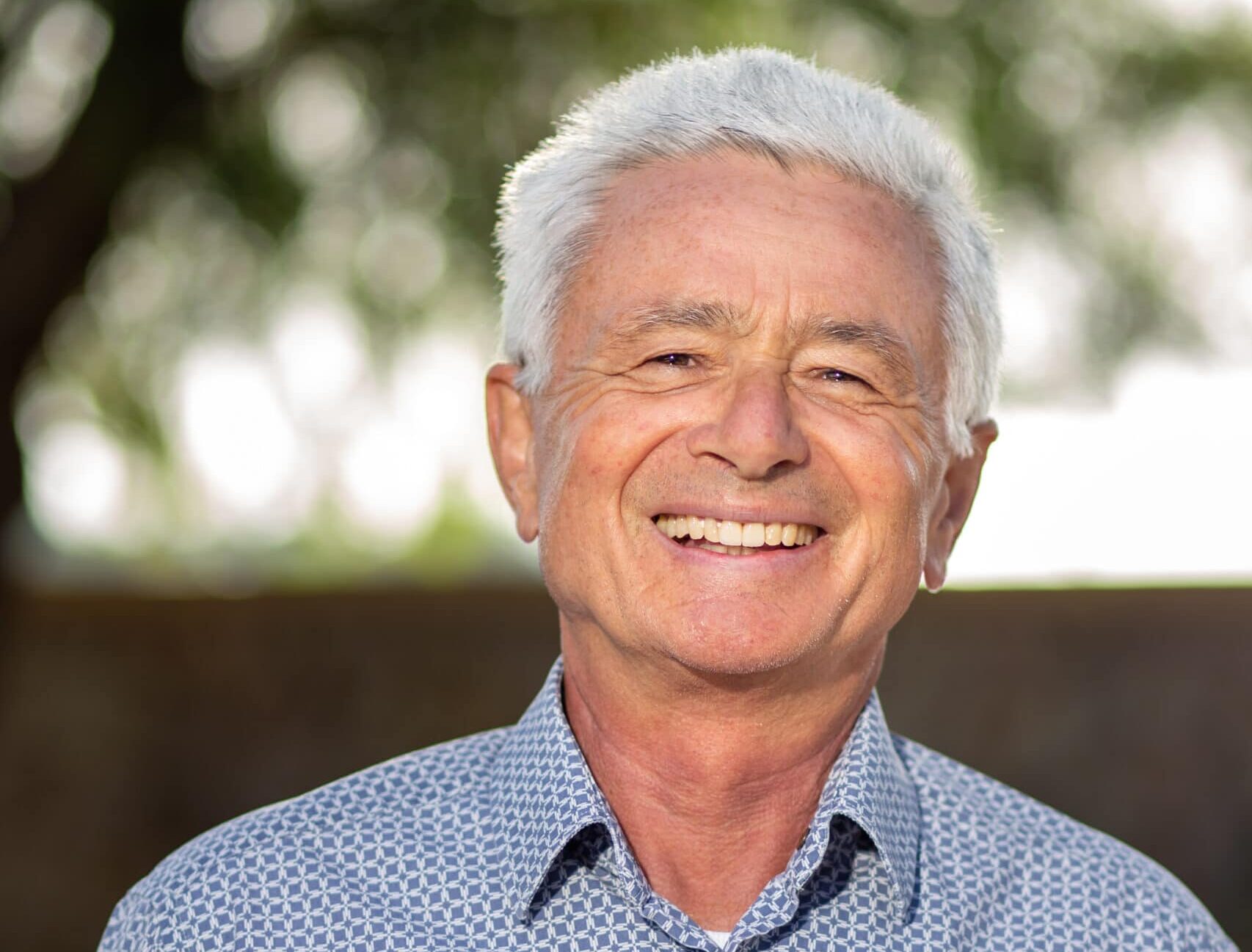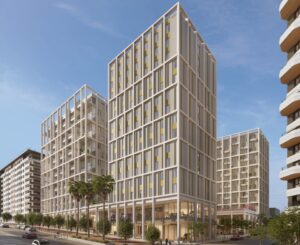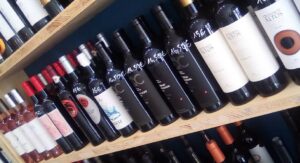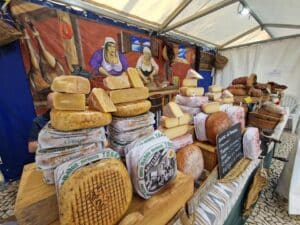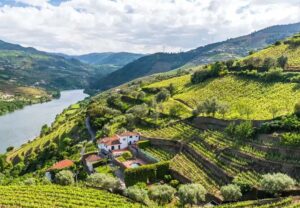From banking boardrooms to award-winning wines
The quaint village of Estombar is abuzz with a bittersweet sentiment. Quinta dos Vales, the renowned wine-tourism estate nestled amidst rolling hills and sun-drenched vineyards, is undergoing a change of guard.
After 17 remarkable years at the helm, Karl Heinz Stock, the estate’s visionary founder, has passed ownership and management to João Cascão, a professional with a long and successful experience in finance and tourism.
This transition signifies not just a shift in leadership, but the culmination of a captivating journey – one intricately woven with Karl’s diverse international experiences.
Beyond the picturesque facade of Quinta dos Vales lies a story of innovation and unwavering passion. While the estate has become synonymous with award-winning wines produced in the heart of the Algarve, winning the competition “Best Wine of the Algarve” eight times in the last 16 years, it transcends the boundaries of a typical winery.

Karl, whose preferred hobby since his 20s has been sculpting, transformed the entire property into a living, breathing art gallery. Sculptures and installations dot the landscape, seamlessly integrating with the sprawling vineyards. Visitors can embark on immersive wine tastings and tours, participate in creative workshops, or even become active participants in winemaking through the pioneering “The Winemaker Experience”. But what exactly fuelled these daring and ultimately successful decisions?
Karl’s early days as a corporate banker in Germany instilled in him a deep appreciation for the dynamism of a thriving economy. He witnessed first-hand the vital role of a strong middle class and the benefits of upward mobility. An economy which allows talented and driven individuals to thrive, regardless of their background, is bound to succeed.
The crucial element Karl identified in this regard are small- and medium-sized companies, and this understanding would later influence his investment decisions in Portugal. Recognizing their crucial role in driving growth, he strategically invested in a diverse portfolio of SMEs across the country. From stone processing and construction to print media, his investments spanned various industries.

Notably, Karl didn’t take an operational role in these companies. Instead, he empowered existing management while offering valuable guidance and strategic support. This approach fostered the continued success of these businesses while allowing him to contribute his expertise to a wider segment of the Portuguese economy.
However, a closer look at Karl’s career trajectory reveals a man who consistently challenged the status quo. Which is why it came as no surprise to family and friends when it became evident that Karl’s calling wouldn’t be confined to the sterile confines of the banking world.
In 1988, a trip to Russia sparked a completely new chapter. The country, then in the throes of post-Soviet upheaval, presented a unique set of challenges. Undeterred, Karl co-founded the STT Group, the first real estate development company in Russia. This seemingly impossible feat was achieved through sheer determination and innovative spirit.
When legal ownership, a fundamental pillar of real estate development, remained a foreign concept in Russia, Karl didn’t shy away. He spearheaded a collaborative effort, bringing together leading legal experts and government officials.
This ground-breaking collaboration required the setup of the first private Russian law firm, followed by the drafting of Russia’s first real estate laws, a historic achievement that resulted in him being offered an honorary doctorate from Moscow University.

This relentless drive and pioneering spirit became hallmarks of Karl’s approach to business. After establishing STT Group as a leading player in the Russian market, he embarked on a new challenge – becoming managing partner of Sibir Energy, a London-listed oil company, which was under significant financial and licensing problems with its oil fields in Western Siberia. Under his guidance, the company witnessed phenomenal growth, partnered with Shell in the exploration of the oil fields, culminating in a trading volume of around 2.5 billion GBP by 2005.
In parallel, the STT Group continued to thrive, and attained a completely new level, which allowed the Group to bring in experts and specialists from all over the world, such as the frequent cooperation with renowned architect Sir Norman Foster (the architect behind The Gherkin).
Furthermore, the largest multinationals were the exclusive clients of STT, such as the IMF and Exxon, and partnerships were entered with huge corporate partners such as British Petroleum, running together the first modern gas station chain in Moscow, a project which Karl started already in the early 90s.
Keeping that same pioneering spirit in Portugal, when he understood that his dream was to produce wine in the Algarve, he knew he was in for another challenge. He recognized the high costs associated with agriculture in the Algarve, a region better known for its stunning beaches and vibrant tourism industry.

This realization led him to make the concept of wine-tourism the founding principle of Quinta dos Vales, a model that has now become widely adopted across the region. By offering a holistic experience that combined wines with art, culture, and breathtaking scenery, Karl not only secured the financial viability of the estate but also established it as a must-visit destination in the heart of the Algarve.
But Karl would be the first to tell you that his success should not be solely attributable to his own ingenuity. He understood the power of collaboration and learning from past experiences. His contact with the Russian government during his time with the STT Group exposed him to the intricacies of public policy and the delicate balance between private and public sector influence.
He witnessed how private interests could be wielded for positive societal change, as exemplified by his role in drafting Russia’s real estate laws. However, he also saw the negative consequences of unchecked self-interest. These lessons deeply influenced his approach when he started looking into Portuguese politics.

In Portugal, Karl championed the “Deixem-nos Respirar” campaign. This initiative focused on streamlining bureaucratic processes that were hindering the growth of small and medium-sized enterprises (SMEs). True to his belief in the importance of a strong middle class, he recognized the critical role that SMEs played in driving economic progress.
The campaign, backed up by more than 100 SMEs with a combined equity base of more than one billion Euros, unlike many others, didn’t resort to empty criticism. It presented concrete solutions, outlining how bureaucratic hurdles could be eliminated and the positive impact it would have on the national economy.
While not all the proposed measures were implemented, the campaign did successfully bring attention to the issue of bureaucratic inefficiencies. And, far more importantly, that there are solutions to these inefficiencies; it is not a plight that needs to be tolerated.
Today, as Karl steps away from Quinta dos Vales, he leaves behind a legacy of innovation, collaboration, and unwavering dedication. In his own words, “I have been very fortunate to live my dream. I want to express my sincere thanks to the local community, to the artists who have worked with me, to our clients, and, most importantly, to the team of Quinta dos Vales”.

